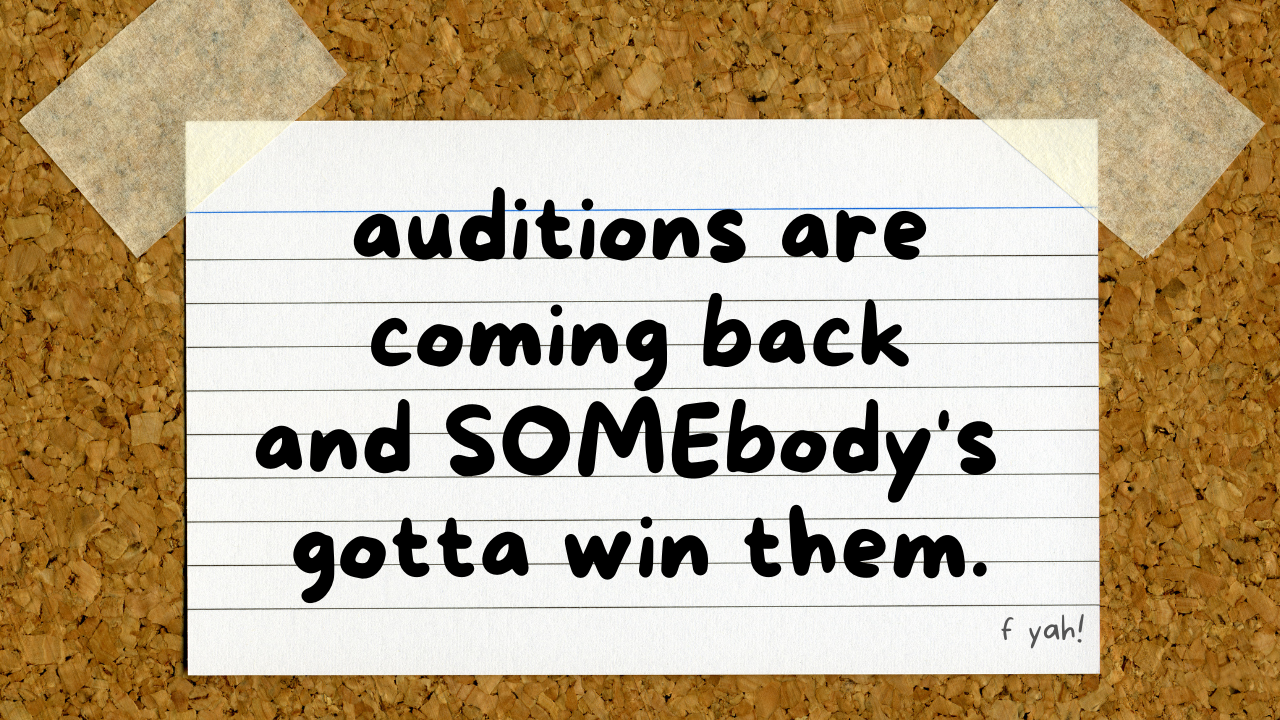what are the top excuses you hear from people after they lose an audition?
i asked this exact question last year in the auditionhacker alliance and got some interesting results.
i was expecting to hear some silly ones, like, “the proctor coughed and messed me up!” or “someone turned on a vacuum cleaner backstage, so i played louder to drown it out. i must have gotten cut because i played too loud!”
here’s what people said:
what do all those things have in common?
some of them are blaming members of the committee for having the wrong priorities, like “they only value technical perfection.” some complain about the rigged system, like “they already knew who they wanted.”
but… what’s missing there? (who don’t they blame?)
they don’t blame themselves.
of course! it’s hard to blame yourself after losing an audition. it feels…wrong. and sometimes it’s true. BUT. in my opinion, whether or not you yourself deserve the full blame, it’s the only productive thing you can take from the experience. blaming yourself for things is literally going to help you win at an audition…someday.
look. we’ve all been there. we’ve all gotten cut at auditions. (i did 40 times, in case you were wondering.)
if you’re always looking for someone or something else to blame, then you’ll feel better immediately. but it will take that much longer for you to address your own weaknesses and actually do well at an audition.
the sooner you redirect the blame towards yourself, the sooner that you can actually DO something about it.
(this exercise is called “admitting that you either didn't practice enough or do the right things," and it’s a pretty effective one.)
so…if you’re ready for it, here is a list: 6 reasons you actually got cut, and some action tips of what to do about it.
6 reasons you *actually* got cut (even if you think you practiced enough)
1) something sounded musically funky in your excerpt.
how many times have you heard, “i don’t hear the orchestra playing behind you through your excerpt”?
the audition panel will most likely have a bunch of experience with each excerpt. at the very least they’re going to have an idea in their own mind about how it should go.
when you’re LEARNing the piece, you are forced to make about a million tiny choices for each note and each phrase. how long do you wait at the end of this rubato? how exactly should the crescendo be shaped?
you need to research every nook and cranny of what’s happening in the orchestra during your excerpt – so much so that you become an authority on it. immerse yourself in the music. you need to be a human embodiment of that piece. the knowledge you gain while doing this research will help you make rational and realistic choices about phrasing, style, and sensitivity so it doesn’t sound like you’re just playing a group of notes.
also, when i don’t know a piece well enough, i worry a lot about whether it “sounds right”. and i know myself…i’ll end up hunkered down over a spotify playlist right before the audition, and that’s not somewhere i want to be. doubt causes worry. worry causes a loss of confidence. a loss of confidence turns into nerves. and, ladies and gentlemen, nerves make you shake.
what to do: epically research the excerpt so you know the piece better than anyone could know it ever.
2) you got lost in the excerpt somewhere.
my most common cause of nerves was the fear of forgetting where i was in the excerpt because i didn’t have the notes quite down yet.
#realtalk: you have to learn the notes.
i’m talking rock-solid. and those notes need to be ingrained in you. solid. you have to not only know the notes, your muscles have to know the notes, and every other detail in the music besides the notes.
when you don’t have a trustworthy, muscle-memorized level with each excerpt, then you start to worry. you worry about whether you’re going to hit the right note or that you’re going to get lost. and then you do.
you don’t want to be in that position. you want to have the notes in your mouth (wind + brass players), in your fingers, in your muscles, and in your mind so that you don’t even have to focus on those pesky notes anymore.
only when you learn the notes truly thoroughly can you give yourself permission to focus on the other necessary components of presentation and performance, like phrasing and character.
what to do: drive every note and every detail into your muscle-memory to the point where it’s ingrained completely, thoroughly, and confidently.
3) something very basic was wrong, and you didn’t even notice.
you may have learned the notes like a madman and you may have muscle-memorized every single motion and detail written on that page. but without listening to a recording of yourself, you have no idea if it sounds like you actually want it to sound.
when you’re playing and listening to yourself at the same time, that’s multitasking – often a very necessary skill. but multitasking while you’re practicing for an audition is like texting and driving. you can’t do either one as well and you end up spelling everything wrong and driving off a cliff. during audition preparation, you want to come face to face with your own personal sound without the hindrance of actually having to play while you listen (weird, right?).
what to do: record yourself. often. intensely. problem-solve the *%&$ out of your excerpt, one thing at a time.
and when you record, really take note of what’s coming across. it’s an opportunity to be honest and #real with yourself. fix whatever you’re hearing and not loving! learn the difference between your mistakes in your playing (we all have them) and your errors in your decision-making.
when you don’t record yourself, you have no idea how you sound outside your own headspace. that causes doubt, which causes worry. worry causes a loss of confidence. a loss of confidence turns into nerves. nerves make you shake. (see a trend here?)
4) your excerpt sounded totally different in the audition than it did (so many times!) in the practice room.
we’re musicians. music is a performance art. and your excerpts are different in the practice room than they are in the audition situation.
listening to a recording is not the same as playing for other people. when you record yourself, it’s a low-stakes snippet of a moment when there’s really nothing on the line; you might even be giving yourself a free pass on issues you don’t consider to be problematic.
playing for others can be a huge reality check or even the kick-in-the-pants you may need to sew up those issues that still might be lurking around. what it does is it uncovers the real, actual version of your excerpt rather than the comfortable practice room version.
what to do: you have to practice performing.
i want you to do realistic mock auditions for lots of people. and you have to observe the type of problems that pop up during these realistic mock auditions so that you can fix them. it’s the next-level of problem solving.
5) something random happened and it threw you off.
anything can happen when you get to an audition.
the vacuum cleaner goes off. you waited in a warm up room for 3 hours. you play in a room completely different than you’re planning on. you have to carry your instrument up a few flights of stairs. the panel decided to lower your chair in from the ceiling (ok, that would be pretty rad). those things should be so comfortable to you by the time you get to the audition that nothing can affect you.
and the only way to do that is to literally experience so much variety of circumstances in your mock auditions that you can’t help but feel on top of the world at your audition. no matter what they throw at you, you’re ready.
great auditioners are ready for anything.
what to do: ruthlessly put yourself into scary mock audition situations.
make them seem like real auditions. do that over and over to get used to that feeling. and vary the circumstances for each audition. that way, you can both observe what goes wrong when you have nerves, and you can get used to the moment to moment experience of being in the audition.
6) you made last minute changes, and they didn’t go well.
this, my friends, is a planning issue.
when you get to the end of your audition training, you might be tempted to make big changes based on some last-minute commentary or critique.
i get it. if you’re getting close to the audition day, it starts to feel real. you’re going to start feeling a little desperate to gain any last minute advantages. every comment from a mock audition is going to throw your decisions into question. and it’s tempting to reconsider all the work you did leading up to the final week.
those big changes are knee-jerk reactions. by the time you get to the last week or two, everything should be in place and you should be ready to present something polished based on an incredible trajectory and depth of research, authority, attention, and work.
if you make major changes in the last week of your audition prep process, those changes aren’t based on hard work and methodical preparation. they’re based on last minute impulse reactions.
what to do: do good work for the entire audition preparation process. and then...trust your work and do what you planned to do. if you are faced with a tough decision during the last few days of your prep, make the decision based on incredible work you already did and not the new variation.



















i've worked with hundreds of musicians on audition preparation. and nothing - NOTHING - has been as effective and life-changing as when they start self-recording the right way.